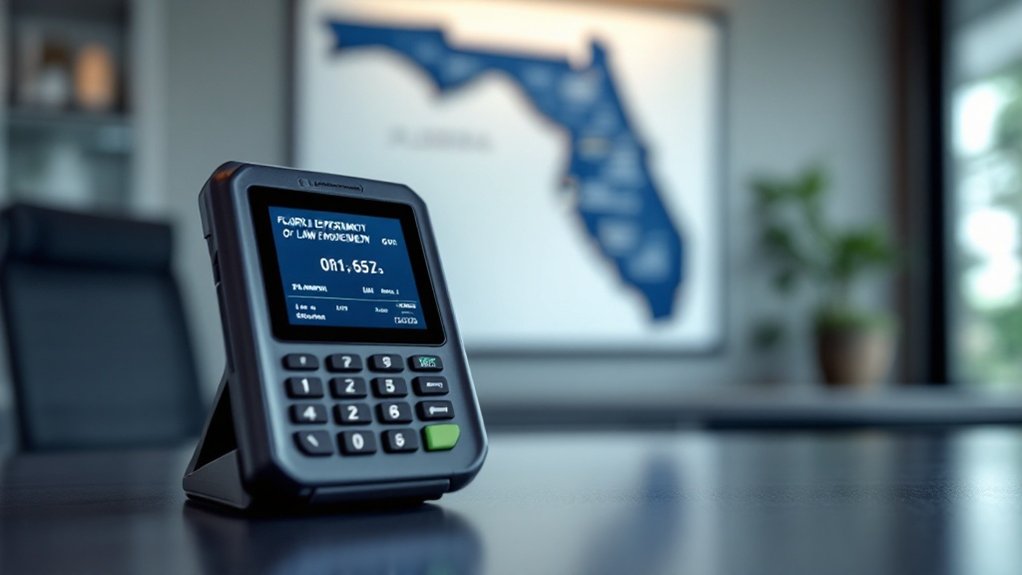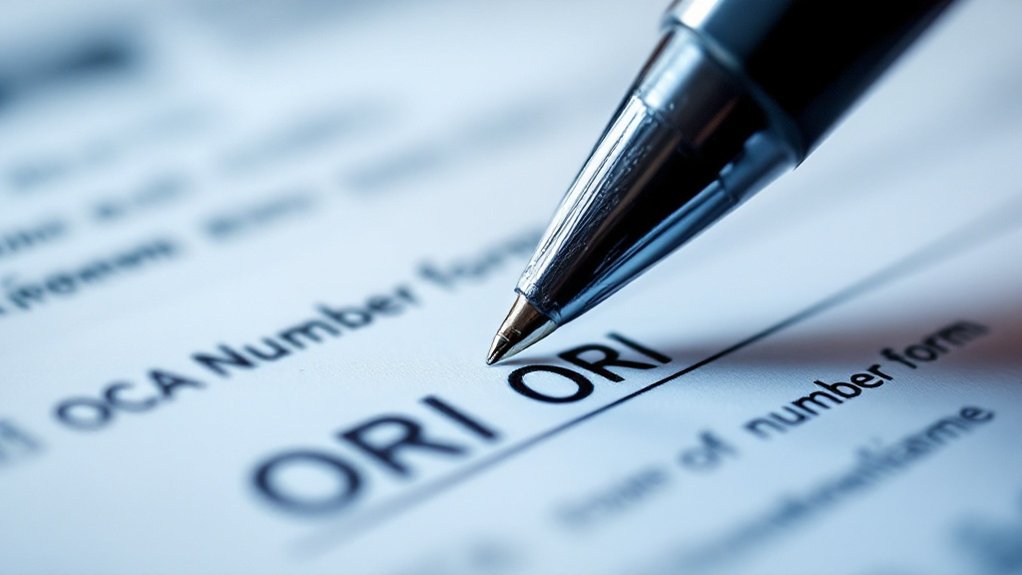When you undergo a Level 2 background check in Florida, you’ll need an ORI number, a unique identifier that guarantees results are sent to the appropriate agency. It typically consists of a 9-digit code, starting with state or agency identifiers, and is vital for routing results correctly. You’ll obtain this number from the employer or during the application process. Understanding ORI numbers is essential to traversing Florida’s background check process, and exploring further will provide more insights into their role and application.
Understanding ORI Numbers

Understanding ORI numbers is essential for traversing background checks in Florida, especially when you’re applying for professional licenses or certifications. An ORI number is a unique identifier that agencies use to process background checks, ensuring results are sent to the correct regulatory body. In Florida, ORI numbers are mandatory for Level II background checks. You’ll typically receive your ORI number from your employer or during the application process for licenses. If you’re unsure, you can contact the relevant agency directly. ORI numbers are indispensable for various professions, including healthcare and education, and are used alongside other identifiers like VECHS numbers for specific programs. These identifiers, such as the ORI number, are crucial for directing background check results to the appropriate state agency, ensuring compliance with regulatory requirements.
ORI Number Structure and Purpose
When you examine an ORI number, you’ll notice it typically consists of a 9-digit code, starting with two characters that identify the state or agency, followed by additional characters. This structure allows for agency identification, such as embedding the abbreviation of the requesting agency like AHCA or DCF. By understanding the composition and purpose of ORI numbers, you can see how they guarantee that background check results are routed correctly and comply with regulatory requirements.
ORI Number Structure and Purpose
In Florida, an ORI number serves as an essential identifier in the background check process, particularly for Level 2 checks. It is a 9-digit code that identifies the agency requesting the check, guaranteeing results are routed correctly. The first two characters often identify the state or agency involved, followed by additional characters that specify the organization. This number informs the FBI and FDLE about relevant statutes and which offenses to scrutinize, determining where results are sent upon completion.
As you navigate the background check process, understanding the ORI number’s structure and purpose is indispensable. It assures compliance with specific statutes and facilitates accurate result delivery, making it a mandatory requirement for Level 2 checks in Florida. Additionally, the ORI number is crucial because it ensures that background check results are sent to the correct destination, which is facilitated by the ORI number being correctly identified and used during the process.
Number Format
The ORI number, a pivotal component in Florida’s background check process, is a 9-digit identifier that typically begins with letters followed by numerical characters. It often includes state or agency identifiers, such as “FL” for Florida, and a unique agency code like “AHCA” for the Agency for Health Care Administration. Some ORI numbers end with a letter, such as “Z.” While most follow a similar structure, variations exist depending on the agency or purpose.
You’ll notice that ORI numbers like EAHCA020Z and EDCFGN10Z are used for specific agencies. These numbers guarantee that background check results are routed correctly and comply with relevant statutes.
Agency Identification
An ORI number plays a crucial role in Florida’s background check process by serving as a unique identifier that directs results to the correct agency. It guarantees that background checks are processed according to specific statutes and delivered to the appropriate state department.
- Embedded Agency Abbreviation: Many ORI numbers include agency abbreviations.
- State or Agency Identifier: The first part often identifies the state or agency involved.
- Unique Identifier: Each ORI is unique to a specific agency or purpose.
- Profession-Specific Codes: Different professions have their own ORI numbers.
This structure helps confirm accurate routing and compliance with regulatory requirements. The ORI number must be provided to the Livescan Service Provider (LSP) to ensure that the background check results are correctly routed to the designated agency, using the ORI number as a routing identifier.
Types of Background Checks in Florida

As you explore background checks in Florida, you’ll encounter two primary types: Level 1 and Level 2. Level 1 checks are name-based and state-only, typically used for low-risk positions, while Level 2 checks are more extensive, involving fingerprint-based state and national searches, often required for high-risk roles like healthcare and education. You’ll need to understand these distinctions to navigate the requirements for various industries and professions, especially those involving vulnerable populations.
Types of Background Checks in Florida
When traversing background checks in Florida, you’ll encounter two primary types: Level 1 and Level 2. Level 1 checks are name-based and cover state records, while Level 2 checks are fingerprint-based, involving both state and national searches through the FDLE and FBI. Here are some key aspects of Level 2 checks:
- Comprehensive Coverage: Includes criminal history from state and national databases.
- Required Industries: Mandatory for healthcare, education, and childcare.
- ORI Number Requirement: Necessary for routing results to the correct agency.
- Purpose: Guarantees safety and security in roles involving vulnerable populations. Additionally, Level 2 checks must comply with federal regulations, such as the FCRA, which governs how background information is collected and used.
Level 1 Checks
Level 1 background checks in Florida are a straightforward, name-based process that focuses on state records. They include employment history verification, statewide criminal records checks, and a review of the national sex offender registry. These checks are governed by Chapter 435, Florida Statutes, and are commonly used for low-risk positions due to their affordability and efficiency. They do not include national or fingerprint-based checks, which limits their thoroughness compared to Level 2 checks. Level 1 checks are generally faster and less expensive, making them suitable for industries that don’t require extensive screening.
ORI Numbers by Profession
To navigate the complex landscape of background checks in Florida, you need to understand how ORI numbers are categorized by profession. These unique identifiers guarantee that background check results are delivered to the correct regulatory body.
- Healthcare: EAHCA020Z for AHCA, EDOH0380Z for CNA applicants.
- Education: FL921620Z for DOE/Teacher Certification.
- Business: FL920010Z for Real Estate Sales and Broker.
- Government Services: EDOEA310Z for Department of Elder Affairs. Understanding these ORI numbers helps streamline your background screening process.
OCA Numbers and Their Role

When you’re involved in a background check process in Florida, you’ll encounter the OCA number, which stands for Originating Agency Case Number. This number helps identify the entity requesting the background check and guarantees that the results are delivered to the correct recipient. You’ll typically find your OCA number on the documentation provided for fingerprinting appointments, and it’s often used in conjunction with the ORI number to streamline the process.
OCA Numbers and Their Role
OCA numbers, provided by the Department of Children and Families (DCF), help specify the recipient of background check results, guaranteeing they are sent to the correct agency. They are essential for Level 2 Background Checks, particularly when used alongside ORI numbers. Here are key aspects of OCA numbers:
- Purpose: Identify the provider requesting the background check.
- Structure: Typically nine characters long, starting with a two-digit Circuit Number and ending with “z”.
- Importance: Guarantee accurate delivery of results to the correct agency.
- Usage: Used in conjunction with ORI numbers for fingerprinting services.
In Florida, the process of obtaining background check results involves submitting fingerprints through approved Livescan Service Providers, which require an ORI number to ensure that the results are routed to the correct agency, often in conjunction with OCA numbers.
OCA Definition
In Florida, OCA numbers play a pivotal role in the background check process by identifying the specific provider requesting the screening. An OCA number, or Originating Agency Case Number, is used in conjunction with an ORI number to specify which company or agency should receive the final results of a background check. OCA numbers typically start with “111” or “100” and are composed entirely of numbers. Not every company will have an OCA number, but they are vital for guaranteeing that background check results are delivered to the correct recipient. This certifies that the results are processed efficiently and accurately.
VECHS Numbers for Schools and Daycares
VECHS numbers play an essential role in guaranteeing that schools and daycares comply with Florida’s mandatory background check requirements. These numbers are used for Level 2 background screenings, directing results to the requesting organization via the FDLE. VECHS numbers start with “E” for employees or “V” for volunteers.
- Purpose: Guarantee compliance with background check requirements.
- Function: Direct results to the requesting organization.
- Usage: Mandatory for schools and daycares.
- Importance: Protect vulnerable populations by guaranteeing thorough screenings.
Obtaining and Using ORI Numbers

When you’re preparing for a Level II background check in Florida, understanding ORI numbers is pivotal. These numbers are typically provided by the agency or organization requiring the background check and are often included in application materials. You can also find them on agency websites or by contacting their support line. Employers usually provide the ORI number to applicants.
Using the correct ORI number is essential during the fingerprinting process to guarantee results are sent to the right agency. This prevents delays and certifies compliance with regulatory requirements. Different ORI numbers are used for various professions and licenses, such as AHCA or the Department of Education. Additionally, an ORI number ensures that the background check results are properly routed by containing the agency abbreviation, which helps identify the specific agency involved in the process.
Submission Process for ORI Numbers
To submit an ORI number for a Level II background check in Florida, you’ll need to follow a structured process. This involves using LiveScan fingerprinting with the correct ORI number to guarantee results are sent to the right agency.
- Provide Agency Details: Confirm the submitting agency provides necessary details.
- Use Approved Vendors: Fingerprinting must be done through approved LiveScan vendors.
- Guarantee ORI Number Accuracy: Verify the ORI number to prevent processing delays.
- Comply with Statutes: Certify compliance with relevant Florida statutes through the ORI number.
Additionally, it is crucial to ensure that the fingerprinting process is conducted by skilled technicians, such as those found in Palm Beach Gardens, who can provide Livescan services to ensure high-quality prints for compliance with Florida state and county agencies.
Agency Association With ORI Numbers

In Florida, ORI numbers serve as a vital link between the requesting agency and the background check process. Each agency has a unique ORI number, ensuring that background check results are correctly routed. For instance, the Agency for Health Care Administration (AHCA) uses specific ORI numbers like EAHCA020Z, while the Department of Children and Families (DCF) uses EDCFGN10Z. These numbers are indispensable for Level II background checks, which are required for various professional licenses and certifications.
You’ll find profession-specific ORI numbers across different fields, such as healthcare, education, and business. Employers typically provide the necessary ORI number for job-related checks.
Verification and Routing of Background Check Results**
The verification and routing of background check results in Florida rely heavily on the accuracy of the Originating Agency Identifier (ORI) number. This number guarantees that results are sent to the correct agency, facilitating compliance with legal requirements. Incorrect ORI numbers can lead to misrouted results, requiring re-submission and additional costs.
- Electronic Delivery: Results are sent electronically to the correct agency.
- Agency Identification: ORI numbers identify the requesting agency.
- FDLE Involvement: The FDLE processes checks based on the ORI number.
- Result Accuracy: Correct routing ensures accurate and relevant results.
Conclusion
In Florida, an ORI number is essential for background checks, ensuring results are routed correctly. It’s a 9-digit code identifying the requesting agency. You’ll need this number for Level II checks, which are required for various professions. A common theory is that ORI numbers are complex to obtain, but they’re typically provided by employers or licensing authorities. Understanding ORI numbers helps streamline the background screening process.

